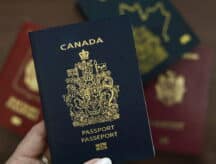Do you need to submit biometrics to stay in Canada?
Immigration, Refugees and Citizenship Canada (IRCC) will collect your biometrics if you are aged between 14 and 79 and applying for, claiming, or requesting:
- Canadian temporary residence (excluding U.S. nationals);
- Canadian permanent residence (including US nationals); or
- Refugee protection.
What are biometrics?
Biometrics refers to data that will help confirm your identity. When giving biometrics, IRCC will collect:
- Biographic data: Name, date of birth, and other personal details of an applicant as listed on the biographic data page of the applicant’s passport or travel document;
- Fingerprints: Fingerprints of the applicant, captured electronically during the biometrics collection session, using an electronic fingerprint-capture device; and
- Photograph: A digital photograph of the applicant.
Moving to Canada? Sign up for our special newsletter!
Who needs to get biometrics?
Permanent residence
You will be asked to give your biometrics every time you apply for permanent residency, even if you have given them before.
According to IRCC, you will be expected to provide biometrics if you are between the ages of 14 and 79, and you are applying for one of the following:
- A permanent resident visa;
- A request to remain in Canada as a permanent resident; or
- A new permanent resident card for the first time, in cases where you were exempt from biometrics enrolment because you were under the age of 14 years at the time of your PR application.
Temporary residence
Temporary residents must give biometrics if they apply for any of the following:
- A temporary resident visa;
- An extension of authorization to remain in Canada as a temporary resident;
- A temporary resident permit;
- A restoration of temporary resident status;
- A work permit or renewal of a work permit; or
- A study permit or renewal of a study permit.
If you have given your biometrics before, you may not need to again when applying for temporary residence.
But since IRCC cannot issue you a visa or permit extending more than 10 years since the date you last provided biometrics, you may wish to voluntarily submit biometrics if you wish to extend your permit past this date.
How much does it cost to have my biometrics collected?
- Individual applicant: $85.
- Families applying at the same time: maximum total fee of $170.
- Groups of 3 or more performing artists and their staff who apply for work permits at the same time: maximum total fee of $255.
There is no fee to give biometrics for a transit visa.
Where are biometrics collected?
Biometrics are collected in person by appointment. Once you have paid your fee and received your biometric instruction letter (BIL), you will have 30 days to have your biometrics collected. You can book an appointment to have your biometrics collected at one of the following locations:
- Visa Application Centre (VAC);
- Service Canada (from inside Canada only); or
- United States (U.S.) Application Support Centre (ASC) (Inside U.S. only).
To avoid fraud, use the official IRCC website to find a location near you, and do not pay for an appointment. Once you have paid the application fee, the biometrics appointment will be free of charge.
Exemptions
According to IRCC, there are some exemptions under which you will not be required to submit biometrics:
- a Canadian citizen or citizenship applicant (including passport applicants);
- an existing permanent resident;
- a visa-exempt national coming to Canada to visit only;
- a head of state or head of government;
- an applicant who qualifies for or holds a diplomatic or official visa;
- a U.S. visa holder transiting through Canada;
- an applicant applying for a visitor visa, study permit, or work permit who has already provided biometrics for a permanent resident application that’s still being processed;
- a child under the age of 14; and
- an applicant over the age of 79 (unless they are claiming asylum).
How will my biometric data be used?
Upon giving your biometrics, they will be encrypted and sent to a secure government database. They will be deleted at the collection location once they have been sent to IRCC.
While processing your application, they will be shared with Royal Canadian Mounted Police (RCMP). Your fingerprints and photo will be also shared with the Canada Border Services Agency so that they may verify your identity upon arrival in Canada.
According to IRCC, they may also share your information with
- other law enforcement agencies in Canada to enforce any Canadian or provincial law; or
- Canadian government institutions or foreign governments, in accordance with Canada’s privacy laws.
Your fingerprints and photo may also be shared with the US, the United Kingdom (UK), Australia, and New Zealand in a way that respects
- privacy laws;
- civil liberties; and
- human rights (including the Canadian Charter of Rights and Freedoms).
What if I can’t get my biometrics submitted in time?
If your ASC and VAC are open, but you are unable to get an appointment date to give your biometrics within 30 days of receiving the BIL, you can use the IRCC web form to explain why you need an extension. IRCC does not guarantee that one will be granted.
If you do need to get an extension for an appointment date that falls past the 30 day mark, you will be expected to provide a screenshot of your appointment confirmation and the appointment date.
You will also be expected to explain why you were unable to get an earlier appointment.
- Do you need Canadian immigration assistance? Contact the Contact Cohen Immigration Law firm by completing our form
- Send us your feedback or your non-legal assistance questions by emailing us at media@canadavisa.com







